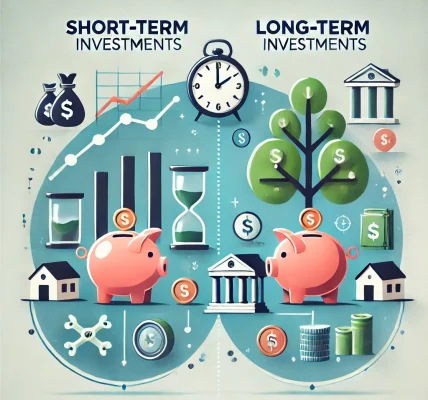Introduction
Economic uncertainty can arise due to various factors such as market volatility, inflation, geopolitical tensions, and global pandemics. During such times, investors often struggle with decision-making, fearing potential losses. However, with the right strategies and expert advice, it is possible to navigate financial turbulence safely while ensuring steady returns. This blog will provide insights into safe investment options, risk management strategies, and best practices for making informed financial decisions during economic downturns.
Understanding Economic Uncertainty
Before diving into investment strategies, it is essential to understand what economic uncertainty means. It typically refers to unpredictable financial conditions that impact businesses, stock markets, and consumer confidence. Common indicators of economic uncertainty include:
- High inflation rates
- Market volatility
- Rising unemployment
- Declining GDP growth
- Geopolitical conflicts
Investors need to recognize these signs early and adapt their portfolios accordingly to minimize risks.
Safe Investment Strategies During Economic Uncertainty
1. Diversification: The Key to Risk Management
One of the fundamental principles of safe investing is diversification. Spreading investments across various asset classes reduces risk and provides a cushion against market downturns. Here’s how you can diversify effectively:
- Invest in multiple asset classes: Stocks, bonds, real estate, and commodities
- Geographical diversification: Invest in international markets to balance local economic risks
- Sector diversification: Allocate funds across different industries like healthcare, technology, and utilities
By diversifying your portfolio, you can ensure that losses in one sector do not significantly impact your overall wealth.
2. Focus on Low-Risk Investments
When uncertainty looms, prioritizing low-risk investments is crucial. Consider these options:
- Government Bonds: U.S. Treasury bonds, municipal bonds, and sovereign bonds offer stability and consistent returns.
- Dividend-Paying Stocks: Companies with a strong dividend history provide steady income and lower risk.
- Precious Metals: Gold and silver act as safe-haven assets during economic crises.
- Fixed Deposits & High-Yield Savings Accounts: These offer guaranteed returns with minimal risk.
3. Invest in Defensive Stocks
Defensive stocks belong to companies that provide essential goods and services, making them less vulnerable to economic downturns. Examples include:
- Healthcare (pharmaceuticals, medical equipment)
- Consumer staples (food, household products)
- Utilities (electricity, water, gas)
Such stocks tend to remain stable even during financial crises, making them reliable investment choices.
4. Maintain Liquidity
Having sufficient liquidity is crucial to handle unforeseen circumstances. It is advisable to:
- Keep an emergency fund with at least 6-12 months’ worth of expenses
- Avoid over-investing in illiquid assets like real estate during uncertain times
- Maintain a portion of the portfolio in cash or cash equivalents for quick access
Liquidity ensures that you can capitalize on investment opportunities when markets dip without being forced to sell assets at a loss.
5. Consider Real Estate Investments
Real estate can be a relatively stable investment if chosen wisely. During economic downturns:
- Rental properties generate passive income
- Real estate investment trusts (REITs) offer exposure to property markets without the need for direct ownership
- Buying undervalued properties during market dips can lead to long-term gains
Ensure thorough market research before making real estate investments to minimize risks.
6. Stay Informed and Avoid Panic Selling
Market fluctuations can trigger emotional decision-making, leading to panic selling. To avoid this:
- Follow financial news and expert analysis
- Stick to your long-term investment plan
- Avoid making impulsive decisions based on short-term market trends
- Consult financial advisors before making major investment moves
A well-thought-out strategy prevents unnecessary losses and ensures a more stable financial future.
7. Dollar-Cost Averaging (DCA) Strategy
DCA involves investing a fixed amount of money at regular intervals, regardless of market conditions. This approach helps in:
- Reducing the impact of market volatility
- Avoiding the risk of investing a lump sum during market peaks
- Benefiting from lower average investment costs over time
This strategy is ideal for long-term investors looking to build wealth steadily.
8. Seek Professional Financial Advice
If navigating economic uncertainty feels overwhelming, consulting a certified financial advisor can be beneficial. A professional can:
- Assess your risk tolerance
- Create a customized investment plan
- Provide insights on tax-efficient investment strategies
A financial expert ensures that your portfolio remains aligned with your financial goals, minimizing risks.
Common Investment Mistakes to Avoid
During economic uncertainty, investors often make mistakes that can lead to financial setbacks. Avoid these pitfalls:
- Overleveraging: Taking excessive loans to invest can backfire in volatile markets.
- Chasing high returns: Risky investments with high returns can result in significant losses.
- Ignoring risk management: Failing to assess potential risks can lead to substantial financial distress.
- Lack of diversification: Putting all money into one asset class increases vulnerability to market downturns.
Conclusion
Investing during economic uncertainty requires a strategic and disciplined approach. By diversifying investments, focusing on low-risk assets, maintaining liquidity, and avoiding emotional decisions, investors can safeguard their wealth and achieve financial stability. Staying informed, adopting smart investment strategies like dollar-cost averaging, and seeking professional advice further enhance financial security.
While market downturns can be challenging, they also present opportunities for those who plan wisely. With the right mindset and strategy, investors can navigate economic turbulence safely and position themselves for long-term success.
By following these investment tips, you can make informed financial decisions without falling into legal complications or excessive financial risks. Happy investing!




